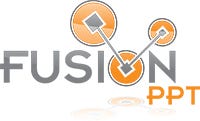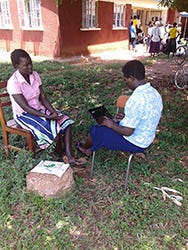Case Study: Fusion PPT’s Handheld Medical Tablet Solution Supports Health Care Workers in Rural Africa
The solution leveraged and extended existing open-source software and created a flexible, repeatable architecture.
March 23, 2016

The Company
 Fusion PPT
Fusion PPT
LinkedIn: www.linkedin.com/company/fusion-ppt
Twitter: @fusionppt
Fusion PPT provides IT consulting and system integration systems to organizations worldwide with challenging technology initiatives. The company prides itself on combining the best practices and expertise found at large consulting firms with a nimble, entrepreneurial and client-focused service team.
The Client
 Established in 2003 as a living memorial for a victim of the 9/11 terrorist attacks on the World Trade Center, the Peter C. Alderman Foundation (PCAF) works to help survivors and communities around the world recover from the emotional wounds of war, terrorism, torture and mass violence. The foundation trains indigenous health workers and establishes trauma treatment centers in post-conflict countries.
Established in 2003 as a living memorial for a victim of the 9/11 terrorist attacks on the World Trade Center, the Peter C. Alderman Foundation (PCAF) works to help survivors and communities around the world recover from the emotional wounds of war, terrorism, torture and mass violence. The foundation trains indigenous health workers and establishes trauma treatment centers in post-conflict countries.
The Challenge
Clinicians in rural areas are often without regular access to technology, Internet and electricity, and so must rely on paper forms to collect patient information and paper files to review patient histories. With patient histories stored at local clinics and hospitals, clinicians could not access needed information when treating a patient on-site. In addition, data collected manually must later be transcribed into electronic systems, a time-consuming process that is prone to data entry errors.{ad}
These problems created particular challenges for a multidisciplinary mental health team established by PCAF in northern Uganda to provide mental health and psycho-social services for pregnant women. Maternal mental disorders are common and disabling in women living in developing countries and can, in turn, deeply impact children’s growth and development. To most effectively serve women in northern Uganda during their pregnancies and through the first two years of their children’s lives, PCAF set up mobile therapy services that greatly expanded their access.
 PCAF turned to Fusion PPT for help in designing an electronic table solution that would overcome the problems of data collection and access in remote areas and enable their health care teams to provide higher quality care to their patients on-site in rural locations.
PCAF turned to Fusion PPT for help in designing an electronic table solution that would overcome the problems of data collection and access in remote areas and enable their health care teams to provide higher quality care to their patients on-site in rural locations.
The Solution
Fusion PPT started with a commercial Android-based, 7-inch touch-screen tablet with a low price point and global availability. The tablet was ruggedized with a casing of low-cost foam to protect it from environmental harm, and Fusion PPT utilized the native Android encryption and remote wipe feature for protection if the tablet was ever lost or stolen.
For data collection, Fusion PPT developed an Android application that allows data collection when the tablet is not connected to the Internet, then synchronizes to a cloud environment when it is connected. In addition, the application downloads a cached version of the cloud data and enables the user to create, search and modify data when the tablet is not connected to the Internet. Fusion PPT also developed a customer XML form for the data collection and an off-line records platform to store the data.
For the server in the cloud, Fusion PPT utilized…
{vpipagebreak}
…Amazon Web Services. The AWS architecture provides for 100 percent uptime and reliability for the server component of the solution. When the table is connected, it synchronizes changes and downloads data from the cloud. All tablets are synchronized and have redundant copies of the information.
The entire solution was created through leveraging and extending existing open-source software and creating a flexible, repeatable architecture that scales and meets individual country requirements for security and patient privacy.
The Results
The Fusion PPT solution allows clinicians to collect patient data, loop up and record patient information in a secure platform and include video and audio recordings to enhance records and increase the pool of clinicians that may provide care. Beyond reducing administrative burdens and errors associated with paper-based data collection, the solution:
Improves care to the patients by providing more information to the clinicians in the field
Increases the time clinicians can spend with patients, since less time is spent transcribing
Provide better analysis on the impact of the care with metrics that cross clinics, regions and territories
Fusion PPT focused on meeting the specific requirements of the PCAF, but its solution can be used by other non-governmental organizations in similar environments.
Do you have a success story you’d like to share? The Channel Partners Case Study Challenge is accepting submissions on a rolling basis. They will be published in a special section on the Channel Partners site, and the best ones will be awarded a Case Study Challenge Winner logo for use on their own websites. The best of the best will be invited to share their stories during a live session at a Channel Partners event. Case studies should be 1,200 words or less. You can download the form, send responses directly to Lorna Garey, editor-in-chief, or use our Web submission process. Let us hear from you!
Read more about:
AgentsAbout the Author
You May Also Like


